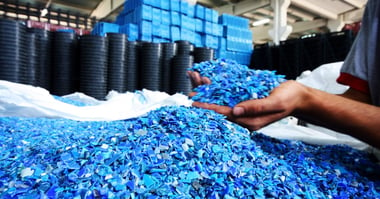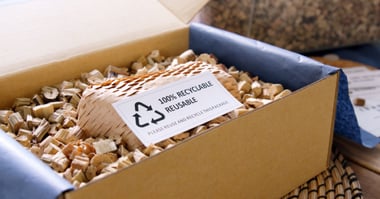
Maura Monaghan
Maura Monaghan has been a digital writer for five years now, covering everything from sustainable ecommerce to types of plastic. She's interested in ecommerce, sustainability, and the ways they can overlap. When she's not writing, she's probably out searching for the perfect cup of coffee.
Sustainable businesses can attract loyal customers and driven employees, and boost their brand image while helping protect the future of our planet.
In some cases, pivoting towards more sustainable business practices can even save your brand money – in short, there are a million reasons to give it a go!
On this page, you’ll find our top nine tips for becoming a more sustainable business, covering everything from energy consumption to your brand’s plastic footprint.
When you’re ready to put these tips into action, we can help. All you have to do is get in touch with our in-house team. Once we’ve received your details, we can arrange a call to discuss which plastic recovery plan will suit your business needs best.
What’s on this page?
01 | Our top nine sustainability tips for businesses
02 | Why is it important for businesses to be sustainable?
03 | Can a sustainability strategy increase sales?
04 | Summary
05 | FAQs
Our top nine sustainability tips for businesses
Conscious consumerism is on the rise, with 9 in 10 consumers believing it’s important for businesses to act in a socially and environmentally responsible way.
With this trend set fully in motion, it's never been more important for brands to embrace sustainability — luckily, we have nine top tips for you below.
1. Ask customers for input
On average, 84% of customers say that poor environmental practices will alienate them from a brand or company – so sustainable businesses are top of mind for consumers choosing where they want to shop.
Passionate consumers are likely to have suggestions on hand for how your company can improve its practices. Taking inspiration from your customers will make them feel heard – and given that one study found that 70% of buying experiences are based on how a customer feels they’re being treated, asking them for input may pay off in sales.
You can reach out to consumers via email, or create a feedback form on your website – and offering incentives, like discounts or freebies, is a great way to encourage responses!
| What do we mean by 'sustainable'? — Environmental sustainability encourages people to live in a way that doesn’t put stress on natural resources. This way, we can maintain an ecological balance in our planet’s natural environment, which will benefit today’s ecosystems and protect future generations. |
2. Reduce your plastic footprint
The lifespan of plastic products averages around 10 years – but they can take up to 500 years to decompose once thrown in the trash. Reducing your plastic footprint is a way for your business’s sustainability strategy to take on one of the most pressing challenges in the field, and there are plenty of ways to get started. You can:
- Analyze where plastic can be removed from a product
- Work with a packaging expert to see whether any other materials would make the product more sustainable
- Recover plastic from the environment by investing in plastic credits
- Encourage your employees to cut back on plastic consumption
- Make simple swaps in your office spaces – for example, switching from disposable to reusable cups and utensils
Want to find out how your brand can better reduce plastic waste? Check out our guide on Capturing the Conscious Consumer, where you can find the benefits of how to introduce a sustainable strategy, advice on how to do this effectively, and ways CleanHub can help you with the transition.
3. Use sustainable packaging
Sustainable packaging includes biodegradable materials, such as bamboo or cotton, or recyclable materials like glass and newspaper. Using these alternatives would be a huge step up from commonly used materials like styrofoam and single-use plastic.
If you’re focused on making a product more recyclable, you should also look into mono-materials, meaning the item will be composed of a single type of material. For example, some companies might have a cardboard container that’s lined with plastic.
Switching to one material will make your product more recyclable, and will be able to feed back into a circular economy.
Food packaging plastics alone account for the bulk of plastic waste polluting our environment, so transitioning toward sustainable packaging is a great way to show your customers that you’re taking concrete steps to make a difference.
4. Allow remote work
It’s no secret that remote work eliminates the need for commuting, which in turn cuts down on carbon emissions and lowers air pollution.
If all or even some of the roles in your business can be done remotely, implementing a full or part-time work-from-home policy is an easy way to boost sustainability – and employee satisfaction. According to one survey, 96% of workers believe that remote work is best for their mental health.
If your business has roles that can’t be done remotely, you can instead consider providing public transit stipends (a regular sum of money given outside of an employee’s actual salary) to encourage employees to take more sustainable methods of transit than cars.
5. Include sustainability in your mission
By solidifying your commitment in writing, you’re reassuring customers that you’ll make a concrete change. Plus, it’s motivating to see how far you’ve come – so measuring your current carbon and plastic footprints and then setting reduction targets is a great way to get started!
You can calculate your carbon footprint using one of many online tools, or try it manually using the Greenhouse Gas Protocol methodology. And if putting your goals out there for all to see sounds intimidating, know that it may pay off: 87% of buyers will purchase a product because its company advocated for an issue they care about.

6. Consider product source materials
Sustainable sourcing means using materials that are renewable, responsibly managed, and ethically produced. This not only protects the environment but also ensures the long-term availability of resources.
And you likely won’t have to worry about your bottom line – over 60% of respondents in one survey said they’d pay more for a product with sustainable packaging. You can start making the switch to recyclable or biodegradable materials yourself, or enlist help from a sustainable packaging business.
By making the effort to switch to sustainable packaging, you may also be eligible for certifications that will boost the eco-credibility of your brand. One of the most well-known of these is the FSC® (Forest Stewardship Council) Certification, which indicates that packaging comes from responsibly managed forests.
7. Encourage sustainable behaviors
Whether it’s offering volunteer days for your employees or using social media to educate consumers on the benefits of recycling, businesses are in a unique position to influence more people to adopt sustainable behaviors.
Just make sure your business is walking the walk too – consumers are sick of greenwashing, and it could land you with a hefty fine!
8. Refine your energy consumption
Energy-efficient practices like using LED lighting or upgrading to energy-saving equipment may cost you more money upfront, but over time you’ll make that money back in the form of lower utility bills.
And in doing so, you’ll be lowering your business’s carbon footprint – an important impact, considering that even a small business emits around 20 tons of carbon dioxide each year – an amount that would take about 42 mature trees to absorb!
These products typically last longer than their non-green counterparts, too – energy-efficient light bulbs, for example, last up to 12 times as long as traditional bulbs. This means you won’t need to pay for more products (and produce more waste) in the long run.
9. Rethink business travel
We’ve all been in that meeting that could’ve been an email – and some of us took planes, trains, and cars to get to it!
The rise of virtual work has shown us that it’s possible to connect and get things done over the phone and video calls – and when people can take meetings from their homes or even more local offices, those reduced plane and train journeys cut down on your business’s carbon emissions.
Reducing travel also saves money on flights, hotels, and meals, which you can then invest back into your company.
Why is it important for businesses to be sustainable?
We all have a part to play when it comes to protecting the environment – especially businesses that can have a larger impact.
100 companies are responsible for 71% of the world’s greenhouse gas emissions, so it’s no secret that businesses can have a monumental impact on the environment. And it’s not just large conglomerates that can make a difference. SMEs make up 90% of businesses worldwide – so imagine the impact that collective action could have!
Plus, new laws and regulations are increasingly focused on environmental impact, meaning sustainable practices can keep you compliant and safe from fines.
By being proactive, you’ll not only contribute positively to the planet but also position your business as a responsible leader in your community.
Can a sustainability strategy increase sales?
In short, yes, building a sustainability strategy is a strong way to help increase your sales.
An average of 37% of consumers intentionally choose stores that prioritize sustainability, so a strong environmental, social, and governance (ESG) strategy can help you attract and retain loyal customers. You’ll also enhance your brand’s reputation and differentiate yourself from competitors.
ESG profitability is clear – one study from Wharton Business School found that businesses that improved their ESG commitments had sales growth of 9.2% the following year. It pays to give customers the results they want to see!
Summary
Implementing sustainable business practices is the right thing to do for our planet, and it’s also beneficial for your profits, customer loyalty, and brand reputation.
If you’re ready to put some of these sustainability tips into action, all you have to do is get in touch with our in-house team. We can then arrange a call to discuss the plastic recovery plans that will suit your business needs best.
FAQs
How to improve sustainability in business?
Because sustainability is such a broad topic, and there are so many needs to address within it, there are plenty of ways to start improving sustainability in a business. These can be small things, like recycling more, or bigger things, like switching to renewable energy sources.
What is meant by sustainability in business?
In business, sustainability is most applicable as a strategy concerning all of the ways a company can have a more positive impact on the environment, usually through waste reduction, mindful consumption, reducing emissions, and other practices.
What are the 7 keys to sustainability?
Since it’s such a huge topic, there are countless keys to sustainability – but we’ve picked the nine tips we think are most actionable and important to explore in this article, from refining your energy consumption to rethinking your business travel.

.webp)
.webp?width=380&name=Plastic-on-the-beach%20(1).webp)
.webp?width=380&name=Sustainable%20christmas%20(1).webp)


.webp?width=380&name=Buying-online%20(1).webp)


.webp?width=380&name=Sales%20(1).webp)
.webp?width=380&name=Sorting-trash%20(1).webp)
.webp?width=380&name=Ecommerce-business-owner%20(1).webp)
